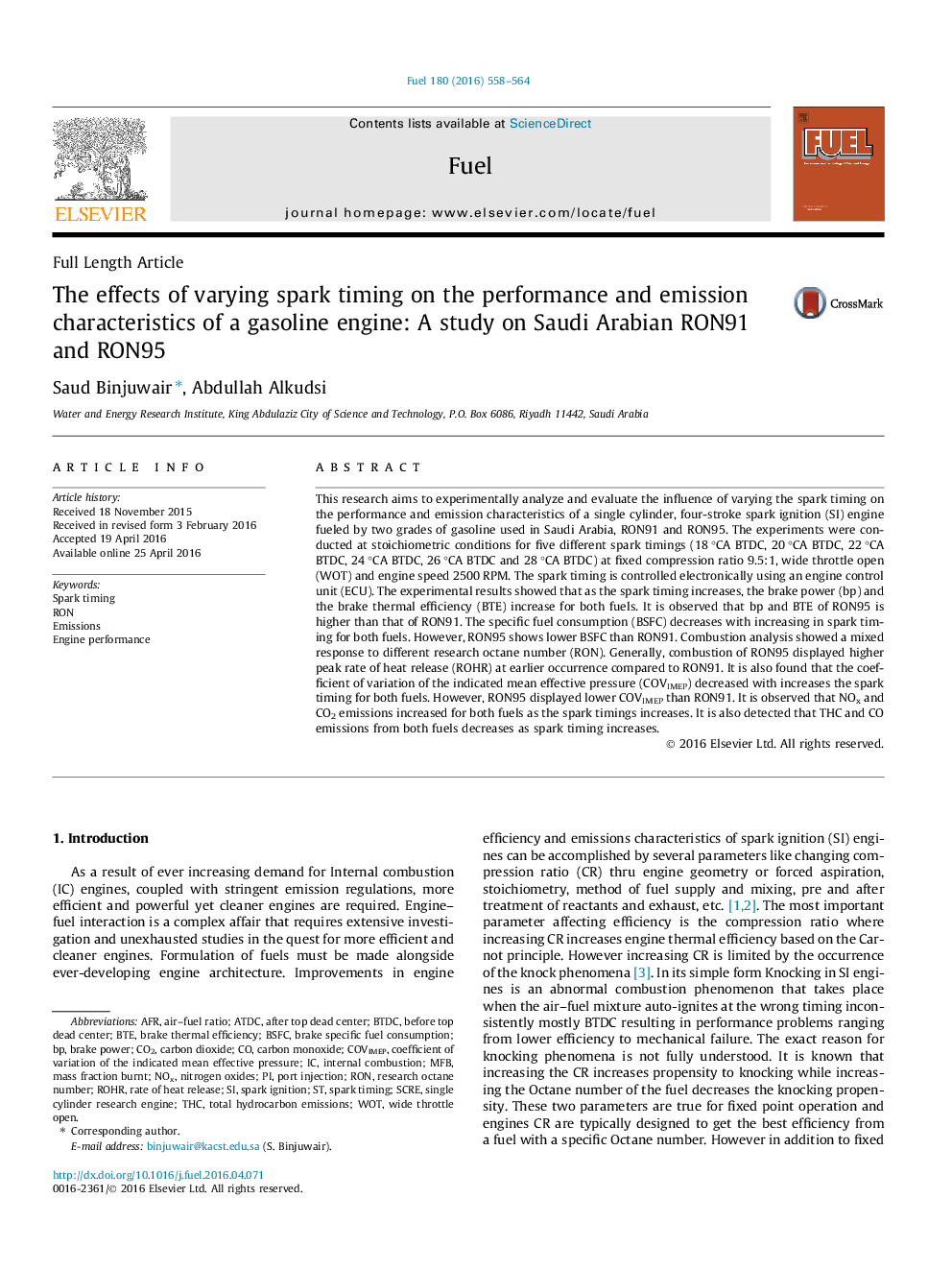| کد مقاله | کد نشریه | سال انتشار | مقاله انگلیسی | نسخه تمام متن |
|---|---|---|---|---|
| 6633836 | 461091 | 2016 | 7 صفحه PDF | دانلود رایگان |
عنوان انگلیسی مقاله ISI
The effects of varying spark timing on the performance and emission characteristics of a gasoline engine: A study on Saudi Arabian RON91 and RON95
دانلود مقاله + سفارش ترجمه
دانلود مقاله ISI انگلیسی
رایگان برای ایرانیان
کلمات کلیدی
air–fuel ratioCOVimepWOTMFBaTDCAFRBSFCTHCbTDC - BTDCNOx - NOXinternal combustion - احتراق داخلیEmissions - انتشاراتResearch Octane Number - اکتان شماره تحقیقNitrogen oxides - اکسید نیتروژنafter top dead center - بعد از مرده مردهbrake specific fuel consumption - ترمز مصرف سوخت خاصPort injection - تزریق بندرspark ignition - جرقه جرقهCarbon dioxide - دیاکسید کربنBrake thermal efficiency - راندمان حرارتی ترمزRON - رونRoHR - روهرSpark timing - زمان جرقهEngine performance - عملکرد موتورbefore top dead center - قبل از مرده مردهBrake power - قدرت ترمزcarbon monoxide - منوکسیدکربنRate of heat release - نرخ انتشار گرماBTE - وسایل کمکCO2 - کربن دیاکسیدmass fraction burnt - کسر جرم سوخته است
موضوعات مرتبط
مهندسی و علوم پایه
مهندسی شیمی
مهندسی شیمی (عمومی)
پیش نمایش صفحه اول مقاله

چکیده انگلیسی
This research aims to experimentally analyze and evaluate the influence of varying the spark timing on the performance and emission characteristics of a single cylinder, four-stroke spark ignition (SI) engine fueled by two grades of gasoline used in Saudi Arabia, RON91 and RON95. The experiments were conducted at stoichiometric conditions for five different spark timings (18 °CA BTDC, 20 °CA BTDC, 22 °CA BTDC, 24 °CA BTDC, 26 °CA BTDC and 28 °CA BTDC) at fixed compression ratio 9.5:1, wide throttle open (WOT) and engine speed 2500 RPM. The spark timing is controlled electronically using an engine control unit (ECU). The experimental results showed that as the spark timing increases, the brake power (bp) and the brake thermal efficiency (BTE) increase for both fuels. It is observed that bp and BTE of RON95 is higher than that of RON91. The specific fuel consumption (BSFC) decreases with increasing in spark timing for both fuels. However, RON95 shows lower BSFC than RON91. Combustion analysis showed a mixed response to different research octane number (RON). Generally, combustion of RON95 displayed higher peak rate of heat release (ROHR) at earlier occurrence compared to RON91. It is also found that the coefficient of variation of the indicated mean effective pressure (COVIMEP) decreased with increases the spark timing for both fuels. However, RON95 displayed lower COVIMEP than RON91. It is observed that NOx and CO2 emissions increased for both fuels as the spark timings increases. It is also detected that THC and CO emissions from both fuels decreases as spark timing increases.
ناشر
Database: Elsevier - ScienceDirect (ساینس دایرکت)
Journal: Fuel - Volume 180, 15 September 2016, Pages 558-564
Journal: Fuel - Volume 180, 15 September 2016, Pages 558-564
نویسندگان
Saud Binjuwair, Abdullah Alkudsi,